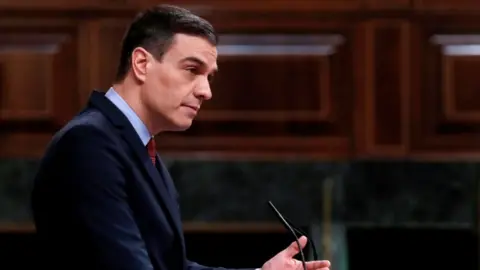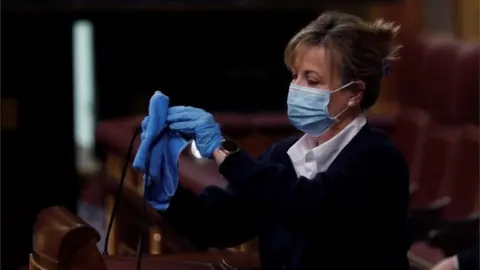Coronavirus: Spanish PM Sánchez sees 'slow and gradual' end to lockdown
 Getty Images
Getty ImagesSpain will slowly ease its nationwide lockdown in the second half of May, the prime minister said, provided authorities stay "on top of the virus".
Pedro Sánchez asked parliament in Madrid for a third extension to the state of emergency until 9 May.
The government has also announced looser restrictions on children, allowing them to leave the house.
Spain imposed its lockdown on 14 March, with some of the tightest restrictions in Europe.
Currently, children are not allowed outside for any reason. After mounting criticism, the government announced plans on Tuesday to allow those aged 14 and under out for walks from 26 April.
Construction and manufacturing businesses were allowed to resume work last week, albeit under strict new social distancing and safety measures.
Spain currently has the most confirmed coronavirus infections in Europe.
Latest data released on Wednesday show the death toll stands at 21,717, rising by 435 in the past 24 hours - the second consecutive day-on-day rise. The total number of confirmed cases has risen to 208,389.
What did Mr Sánchez say?
Addressing parliament in Madrid on Wednesday, Mr Sánchez asked for the state of emergency to be extended for a third time by an additional two weeks.
The prime minister said Spain could then hopefully begin to ease its restrictions in the second half of May, but warned that "de-escalation will be slow".
"We must avoid missteps," he warned. "If we stay on top of the virus and our health system maintains and reinforces that impression, then we will propose another step."
Lawmakers will vote later on the extension. The measure is expected to pass, although some parties, including the far-right Vox and two from Catalonia have said they will not back it.
Mr Sánchez said he expected EU leaders to agree a common economic response to the coronavirus outbreak during a European Council video summit on Thursday.
Spain, as well as Italy and France, has called for greater support from the EU to finance member states' economic recovery.
The opposition People's Party leader, Pablo Casado, bitterly criticised the Spanish government's handling of the crisis as incompetent, arguing that the state of alarm should have been introduced a week earlier.
 EPA
EPA"This is is not a war, as the government likes to compare it to, this is a human catastrophe," he said, adding that his uncle had died and the family were unable to bury him together.
What about Spain's children?
The state of emergency imposed on 14 March had some of the tightest restrictions in Europe - including barring all children from going outside for any reason.
After weeks of confinement, opposition groups, charities and health workers criticised the continuing restriction. Barcelona's mayor Ada Colau took to Facebook, demanding the government "Free our children".
On Tuesday the government announced its plans to ease restrictions, saying children aged 14 and under could accompany their parents on errands.
But there was anger the authorities had not gone further. People in Madrid took to their balconies to bang pots and pans in protest.
"This is a government that listens and next weekend I will issue an order allowing children under 14 to take walks from Sunday, April 26th," Health Minister Salvador Illa said.
Details about where and for how long they can walk will be released later this week. Children will still need to be accompanied by an adult.
What's happening elsewhere in Europe?
- Belgium has reported another 263 deaths, bringing the total to 6,262. More than half the latest fatalities were in nursing homes
- Germany is to begin clinical trials of a new corona vaccine on humans by the end of April, involving some 200 volunteers aged 18 to 55
- In one month, Romania has raised €78 million (£69m) after handing out about 200,000 fines to people who flouted national virus restrictions. It's roughly equivalent to the national corporate tax income for the whole of February
- Traffic cameras in Moscow will now check cars for digital travel permits, as the Russian capital tightens its lockdown measures. Anyone with cold-like symptoms will also have to stay home, as will their family members
- There has been a fourth consecutive night of unrest in the Paris suburb of Villeneuve-la-Garenne. Social tensions have risen further under strict lockdown rules
- The Dutch Football Association "intends not to continue" the top flight's football season after the Netherlands extended a nationwide ban on major events until 1 September
You may also be interested in:

- A SIMPLE GUIDE: How do I protect myself?
- AVOIDING CONTACT: The rules on self-isolation and exercise
- HOPE AND LOSS: Your coronavirus stories
- VIDEO: The 20-second hand wash
- STRESS: How to look after your mental health

